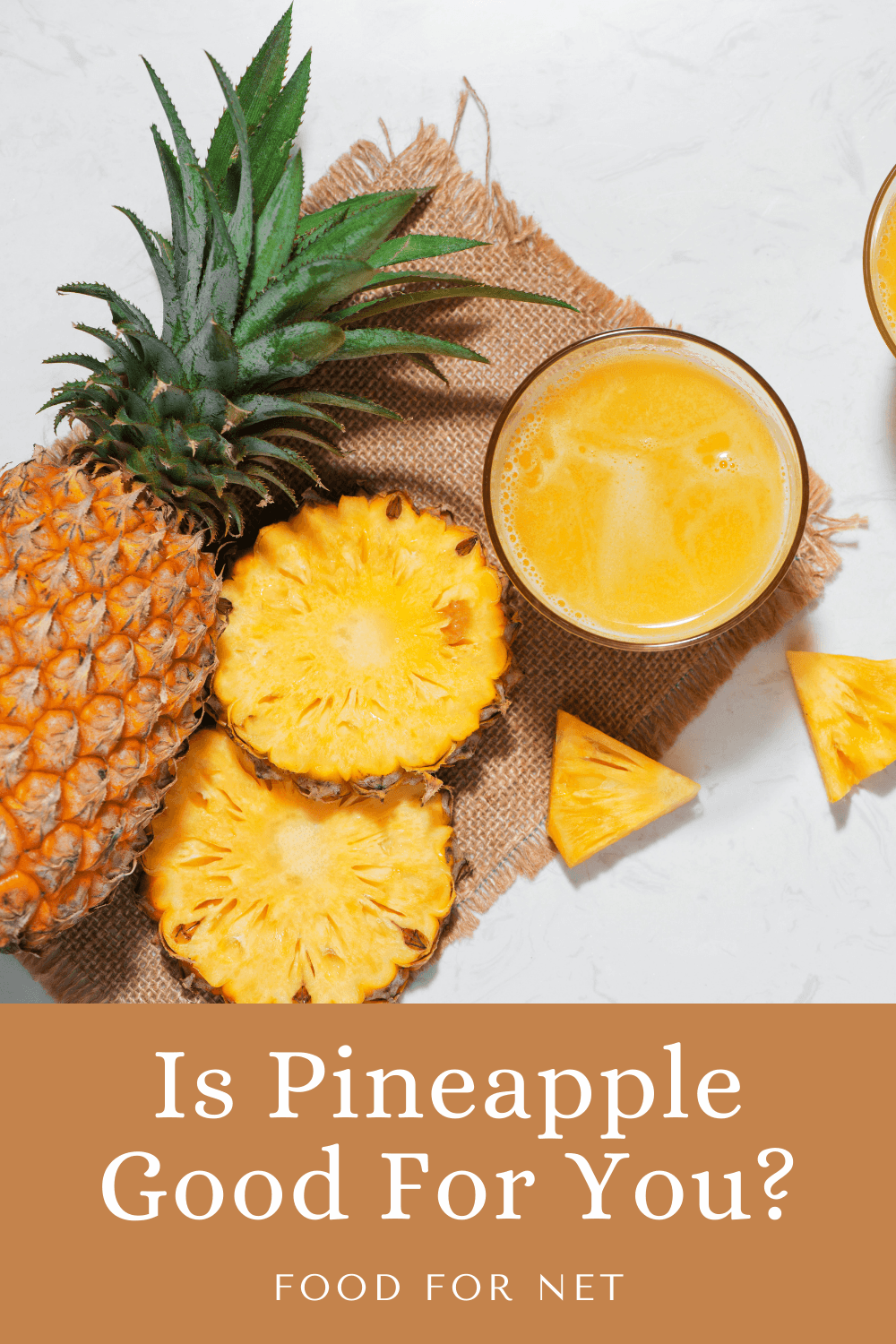
Who doesn’t love pineapple? This incredibly popular fruit is a summertime favorite, one that makes every fruit salad that much more exciting. It’s also readily available in many forms, including fresh, canned, dried, or frozen pineapple, not to mention pineapple juice. Still, we need to ask, is pineapple good for you?
In some ways, the answer here is obvious. Like most fruits, pineapple contains plenty of antioxidants, along with nutrients that can help you to stay healthy. Still, there are issues as well, including the way that too much fresh pineapple actually hurts your mouth.
There’s another thing too.
It’s far too easy to assume that fresh fruits and vegetables are always a healthy choice. They seem like they should be, right? After all, fruit and vegetables are natural. They’re certainly not processed and packed with additives, like many of the foods we eat these days.
Yet, it’s always worth taking a close look at what we’re eating and drinking. There are often hidden benefits and risks, like the way that spinach is incredibly high in oxalates and could contribute to kidney stones or how blackberries are a high FODMAP fruit. Once you understand the benefits and risks of a given food, you can decide how to include it in your diet.
Is Pineapple Good For You?
- The Bromelain In Pineapple
- Other Benefits Of Pineapple
- How Pineapple Could Be Harmful
- Is Canned Pineapple Healthy?
- Are Pineapples Low In FODMAPs?
- Fresh Pineapple Versus Pineapple Juice
- Final Thoughts
The Bromelain In Pineapple
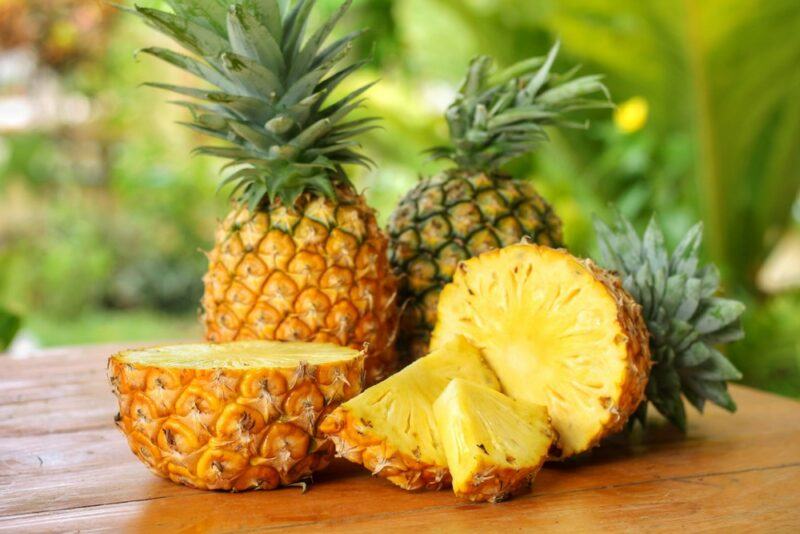
Health discussions often begin by looking at nutrients. This time, though, we need to consider bromelain. Bromelain isn’t a compound. Instead, it’s an enzyme mixture that we find in pineapple (and pretty much nowhere else).
You can even buy bromelain as a supplement and find it in skin creams. This is because the mixture is thought to help in a variety of ways, like decreasing inflammation, improving digestion, better wound healing, and promoting weight loss.
There’s been minimal research into the effects of bromelain, so there’s a lot that we don’t know. Still, it’s clear that there’s at least the potential for benefits and, notably, pineapple is the main dietary source of bromelain.
However, the potential health benefits aren’t the only thing to think about with bromelain. The enzyme mixture is sometimes used to help tenderize meat, as it breaks down amino acids.
This ability to break down amino acids has a frustrating side effect – it happens in our mouths too.
In particular, bromelain dissolves some of the protective mucus from the roof of your mouth and your tongue. That effect, combined with the acidity of pineapple, means that the fruit irritates your mouth in a unique way.
Consume too much pineapple and the mild irritation may start to become painful.
That’s just for the average pineapple eater. Some people are more sensitive to bromelain and might get side effects like nausea and vomiting.
Decreasing The Effects Of Bromelain
If you love pineapple and are sensitive to the bromelain, you could try grilling your pineapple. The heat breaks down some of the bromelain, so the side effects should be reduced as well.
You can also pair your pineapple with a dairy product, particularly something creamy like yogurt. Doing so reduces the side effects somewhat as well, by giving the bromelain a different protein to interact with.
Various anecdotes also suggest that you can use salt water as well. Soaking a peeled pineapple in some salt water may reduce some of bromelain’s effects. There’s little evidence for this effect, but plenty of people swear by it, so it might just be true.
Canned Pineapple And Bromelain
Interestingly, canning pineapple also breaks down the bromelain. This is why canned pineapple rarely makes your mouth tingle in the way that the fresh stuff does.
So, if don’t like how the bromelain feels and don’t mind losing out on some potential health benefits, canned pineapple might be the way to go.
Of course, there are other issues to think about with canned pineapple. We’ll drill into some of these later on.
Other Benefits Of Pineapple
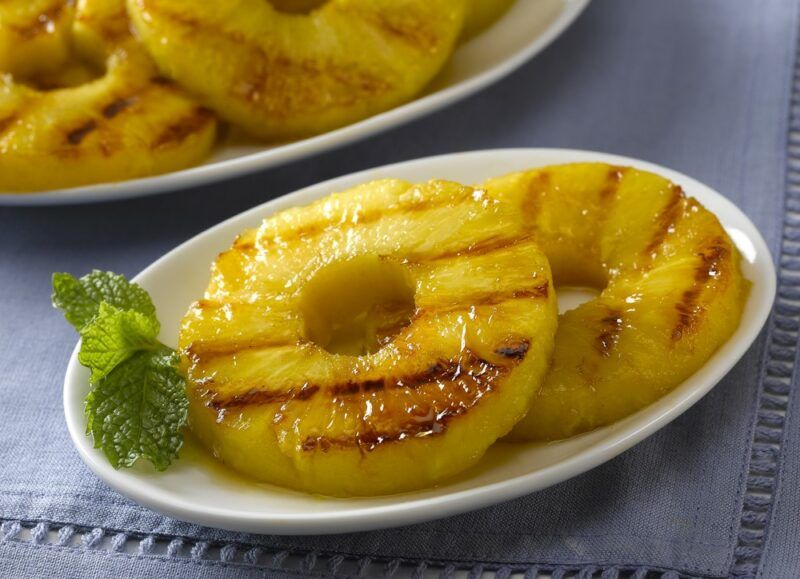
Can Help With Digestion
Pineapple can be particularly relevant for your digestion. The effect partly comes from the fiber content, as a cup of pineapple chunks provides you with roughly 2.3 grams of fiber.
You know about the importance of fiber, right?
Fiber helps in various areas, like by balancing our cholesterol and blood sugar levels. However, fiber is most famous for its digestive effects. Having enough fiber in your diet keeps your digestive system effective and promotes regular bowel movements.
The bromelain in pineapple could help with digestion too, particularly if your pancreas can’t make all the digestive enzymes that it needs. Bromelain supplements may be more powerful here than pineapple, but not necessarily, as pineapple has fiber that you won’t find in the supplements.
Low In Calories
Pineapple is also relatively low in calories, with a cup of pineapple chunks containing around 80 calories. The low number of calories, combined with the fiber and water content of pineapple make it an excellent snack for weight loss.
As surprising as it might seem, even the sugar in pineapple could be helpful if you’re trying to lose weight. After all, pineapple is a much healthier way to satisfy a sugar craving than turning to a processed snack.
Has An Amazing Flavor
We can’t talk about pineapple without at least mentioning the flavor. The flavor is the reason that so many people turn to pineapple again and again.
You’ll even see pineapple flavor turn up in cocktails. Some of them use pineapple juice directly in the cocktail, while others use an ingredient like pineapple vodka instead.
Then there are all the desserts and sweet treats that use pineapple, not to mention how pineapple can be grilled and paired with savory meals. Honestly, the options are endless.
A Decent Source Of Antioxidants

We can’t forget about the antioxidants in pineapple either. These compounds all help fight oxidative damage from free radicals. In doing so, antioxidants are thought to help decrease disease risk, giving us the chance to live longer and healthier lives.
The bromelain we discussed earlier acts as an antioxidant and there are other antioxidants present in pineapple as well.
The Vitamin C Content
Pineapple isn’t an amazing source of nutrients, but it does stand out in one area – vitamin C. You get roughly 130% of your daily vitamin C intake from a single cup of pineapple chunks. Not too shabby, right?
Now, vitamin C isn’t rare. There are many vitamin C rich foods, including fruits and vegetables. Most of us probably meet our daily requirements without even trying.
Even so, increasing your vitamin C intake could easily lead to benefits, including better immune response and decreased heart disease risk. Plus, fruits like pineapple are much more powerful than turning to supplements for your vitamin C.
How Pineapple Could Be Harmful
The Carb Content
Fruits are delicious and sweet. Not surprisingly then, they are a decent source of carbs and sugar.
Eating natural sugar from fruit is much healthier than relying on processed foods that are packed with added sugar or high fructose corn syrup. Even so, the sugar in fruit is far from benign. It can still have many negative impacts on your health, especially if you overdo it.
This is why it’s still important to be wise with your fruit intake.
Pineapple is on the high end for sugar and carbs. A 100 gram serving of the fruit contains 12 net grams of carbs. This is a similar amount as pears, apples, and kiwis – and much higher than berries or watermelon.
This carb content makes pineapple difficult on any low carb or keto diet.
May Be Unsuitable For Some Diabetics
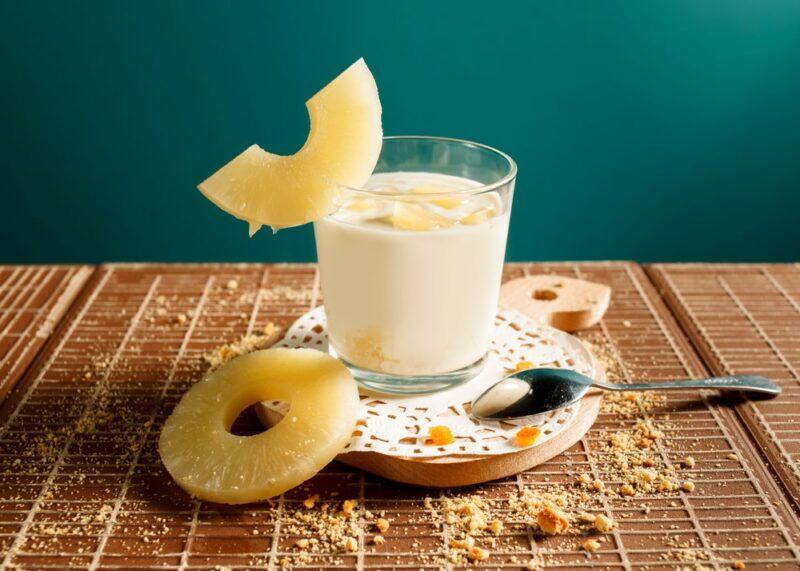
Fruit is always tricky for people with diabetes. On one hand, you’re getting plenty of important plant-based compounds from the fruit, not to mention all the fiber. But, you still have a decent amount of sugar to contend with.
Some people choose to simply cut fruit out of their diet. While this may be the easiest approach, it isn’t the healthiest. Instead, research shows that eating fresh fruit regularly can reduce the risk of diabetic complications.
To manage your condition well, you’ll need to be careful with the types of fruit that you eat and your portion sizes. Pineapple, unfortunately, isn’t a great choice due to its high sugar content.
You could still theoretically have some pineapple, as long as you keep the portion size small. Despite this, many writers suggest avoiding pineapple entirely. After all, there are plenty of fruits with fewer carbs and just as many nutrients (like berries).
Is Canned Pineapple Healthy?
Canned pineapple is much more practical than dealing with an entire fresh pineapple. But, as you’ve probably noticed, the two are quite different. Canned pineapple tends to taste much sweeter and doesn’t have the same sharpness as fresh pineapple, even if you choose a type that’s canned in juice.
The difference extends to nutrition as well.
In particular, canned pineapple tends to be higher in calories, sugar, and carbs than fresh. Canned pineapple does have a little more calcium and potassium than fresh pineapple, but the differences aren’t dramatic.
Vitamin C and folate are quite a different story. The levels of these tend to be much higher in fresh pineapple than canned pineapple. Thankfully though, most of us do get enough vitamin C already.
You’re likely to see more antioxidants in fresh pineapple too. Plus, you avoid any issues related to processing, including the chance for BPA to leach from the can into your fruit.
Not surprisingly then, fresh pineapple is a healthier choice. Still, canned pineapple can be okay if you keep your serving size low. If you are choosing the canned version, look for pineapple that’s canned in juice rather than syrup, as syrup-based versions tend to be higher in sugar.
Are Pineapples Low In FODMAPs?
FODMAPs are particularly important when it comes to fruit. The term refers to a collection of fermentable carbs. These carbs are important because when they ferment in your large intestine, they produce gas, which can lead to a variety of side effects.
For many people, the side effects of FODMAPs are barely noticeable, like a little indigestion or some bloating. Others mightn’t have any problems with FODMAPs at all.
For people with irritable bowel syndrome (IBS), however, FODMAPs can be a much more serious issue. The associated side effects are so significant that IBS suffers often choose to focus on a low FODMAP diet, cutting out most or all high FODMAP foods.
Thankfully, fresh pineapple is low in FODMAPs, making it an excellent part of your diet.
However, be careful with dried pineapple, as this is a more concentrated source of sugar and ends up being high in FODMAPs.
The FODMAP content of canned pineapple is difficult to know, as there hasn’t been much testing. Canned pineapple could be low in FODMAPs like fresh pineapple, but it could also be much higher.
Part of the problem is that pineapple is often canned in juice, which will contain FODMAPs as well.
In the end, you’ll need to do some experimenting for yourself. People respond differently to FODMAPs in food anyway, so some people will have no problems with canned pineapple, while others might need to avoid it.
Fresh Pineapple Versus Pineapple Juice

Pineapple juice is an easy way to get the nutrients from fresh pineapple, along with some antioxidants. It’s also fantastic as a cocktail ingredient.
However, like most fruit juices, pineapple juice needs to be approached with caution.
After all, the juice doesn’t have the healthy fiber that you find in pineapples. Because of this, it has a much stronger impact on your blood sugar levels. It’s also very easy to overdo it with pineapple juice.
Final Thoughts
Pineapple is a delicious fruit that offers some unusual benefits due to the bromalin content. It’s also relatively low in calories and gives you fiber, which is always a good thing.
The biggest issue is the sugar content, which is true for many types of fruit. The amount of sugar here is high enough that diabetics and low carb dieters need to be careful about their portion sizes.
Does this mean you should avoid pineapples though? Not really.
There’s plenty of evidence that fresh fruit offers many health benefits, potentially even helping to decrease the risk of type 2 diabetes and obesity. The most important thing is the same as always – the amount that you’re eating.
As long as the carbs and calories of your fruit are in balance with the rest of your diet, you’ll see many more benefits from pineapple than problems. And, if the sugar in pineapple still seems like too much, why not focus on berries instead? Raspberries, blackberries, and strawberries are all low in carbs and offer just as many benefits as pineapple.
Frequently Asked Questions
Can You Eat Pineapple While Pregnant?
There are a few myths about pineapple and pregnancy, including the idea that the fruit leads to miscarriage. However, these are just myths and pineapple is actually completely safe when you’re pregnant.
That said, pineapple is highly acidic and can trigger acid reflux. This may be a reason to be cautious, as acid reflux is already common during pregnancy. So, if pineapples make your symptoms worse, you might want to avoid them.
How Do You Know When A Pineapple Is Ripe?
The outside of a pineapple initially has a green-gray color that becomes increasingly yellow as it ripens. This color change is the best indication of when the pineapple is ready to eat.
You can also squeeze it slightly. Ripe pineapples are mostly firm but will give a little when gentle pressure is applied.
Is Pineapple Good For Diabetics?
Pineapple has some benefits for diabetics, largely because of the fiber content. That said, it is still fairly high in digestible carbs and has a medium GI, so you’ll need to be very cautious with your portion sizes.
Are Pineapples Keto Friendly?
Pineapple is too high in carbs for most keto dieters, giving you around 11 net grams of carbs in a 100 gram serving. Because of the carb content, many people rely on pineapple essence to get the taste of pineapple, rather than using the fruit itself.
Is Pineapple Good For Weight Loss?
Any type of fruit can help with weight loss. After all, fruit always gives you fiber and is much healthier than many other sweet treats.
However, pineapple doesn’t have any amazing weight loss properties. It isn’t going to dramatically boost your metabolism or make the pounds fall off.







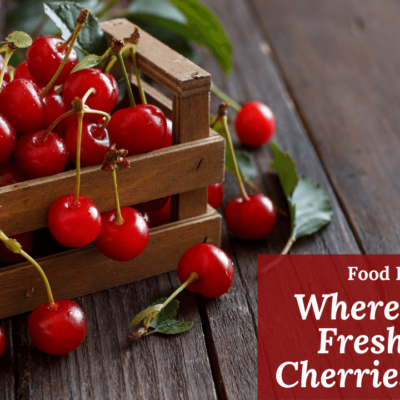

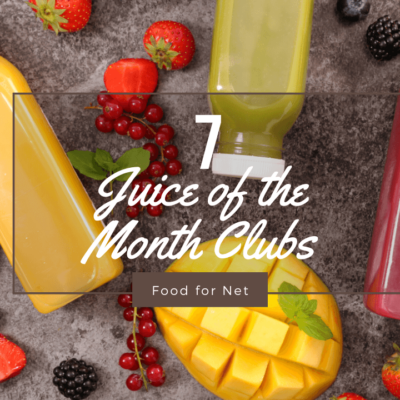



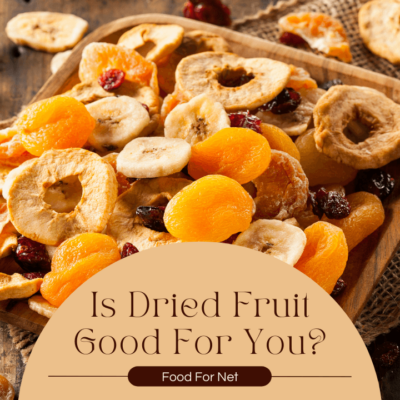

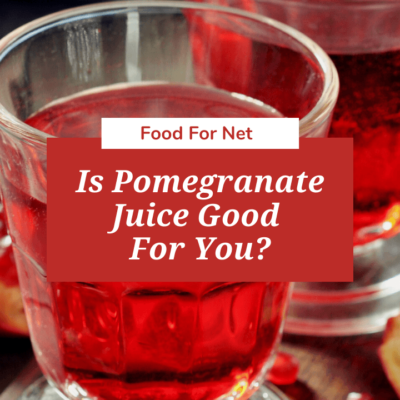
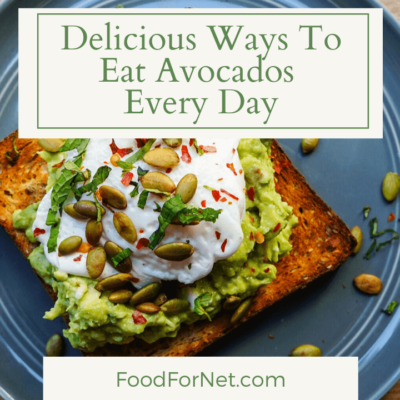
 Are Lemons Good For You?
Are Lemons Good For You?
Leave a Reply